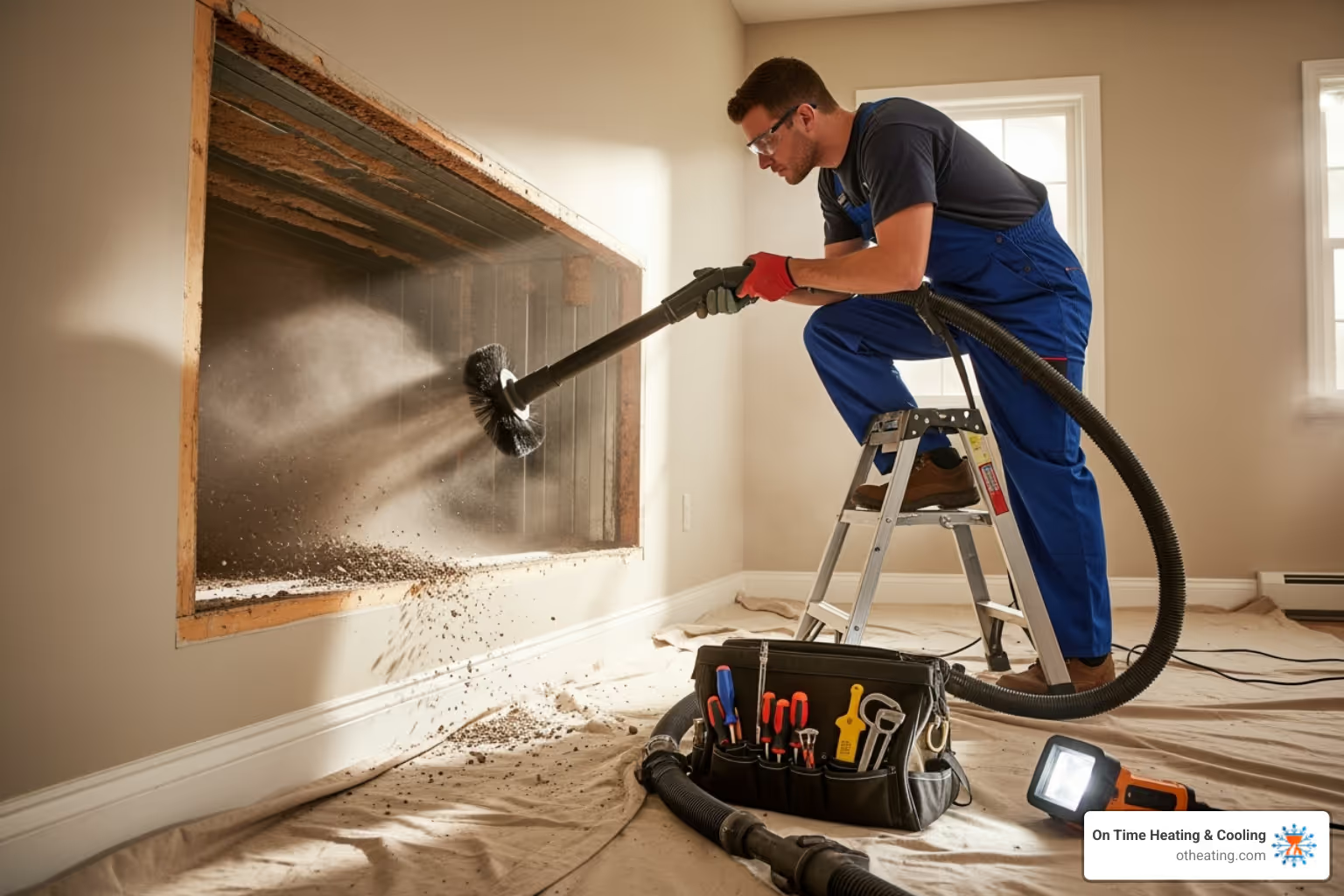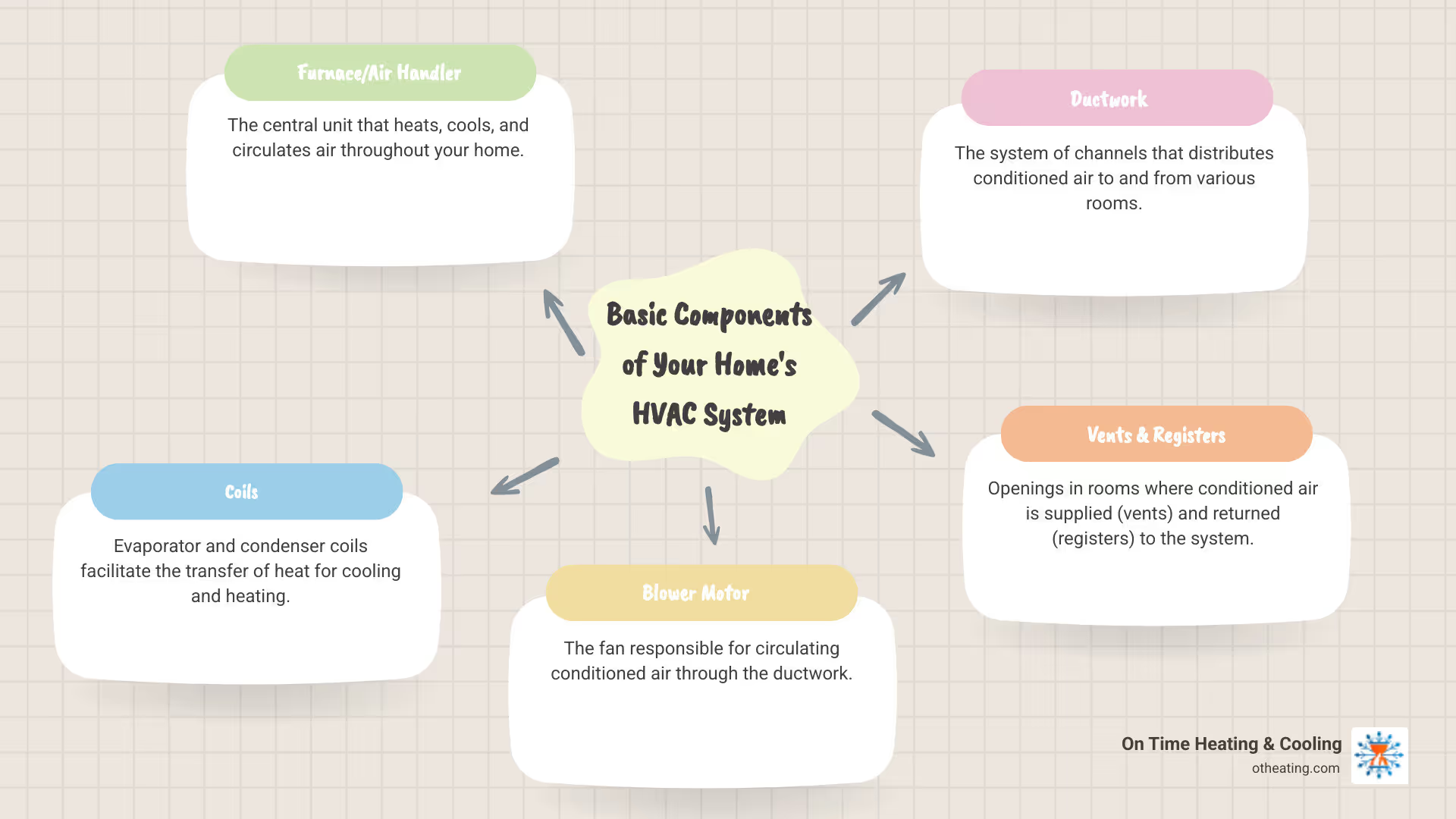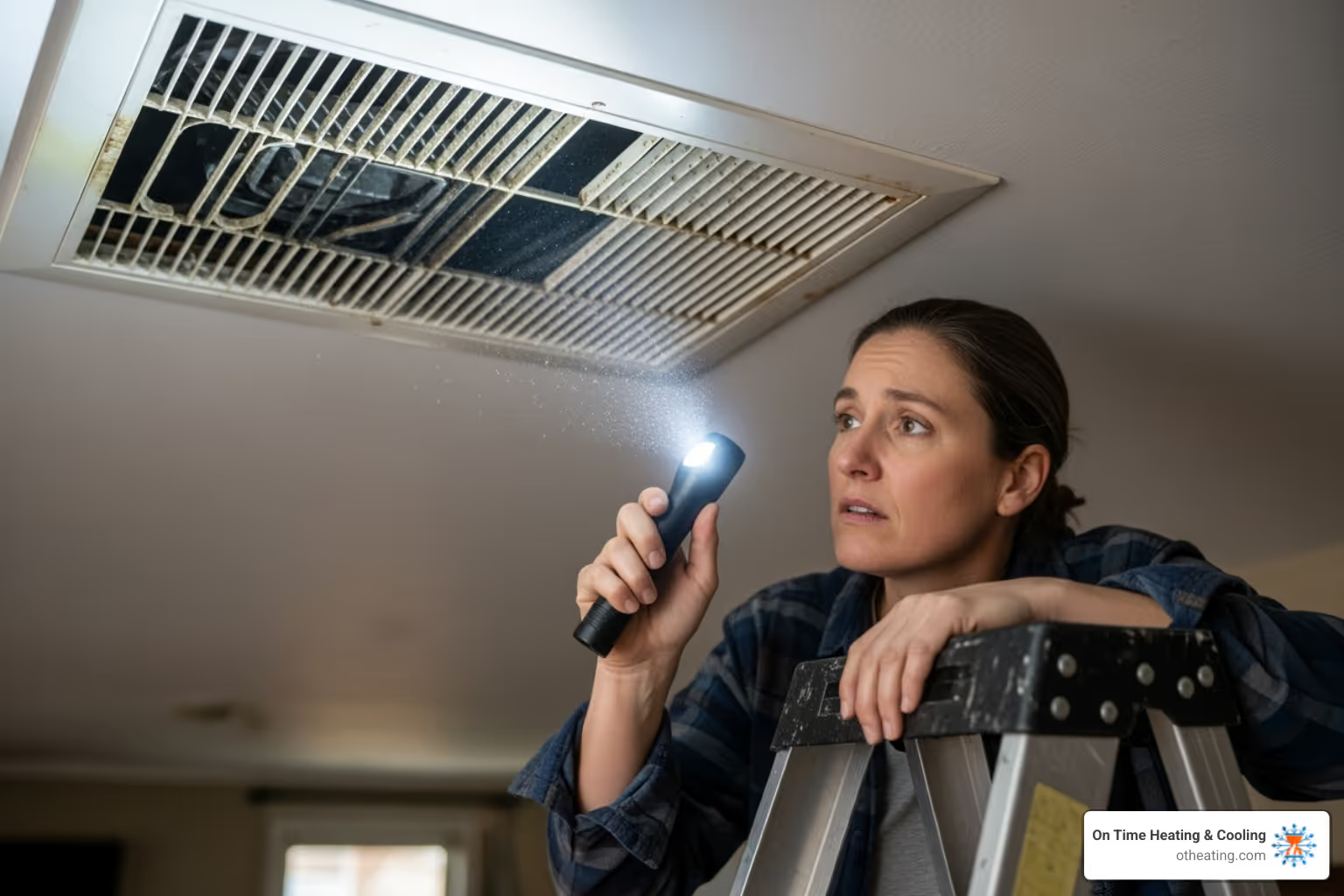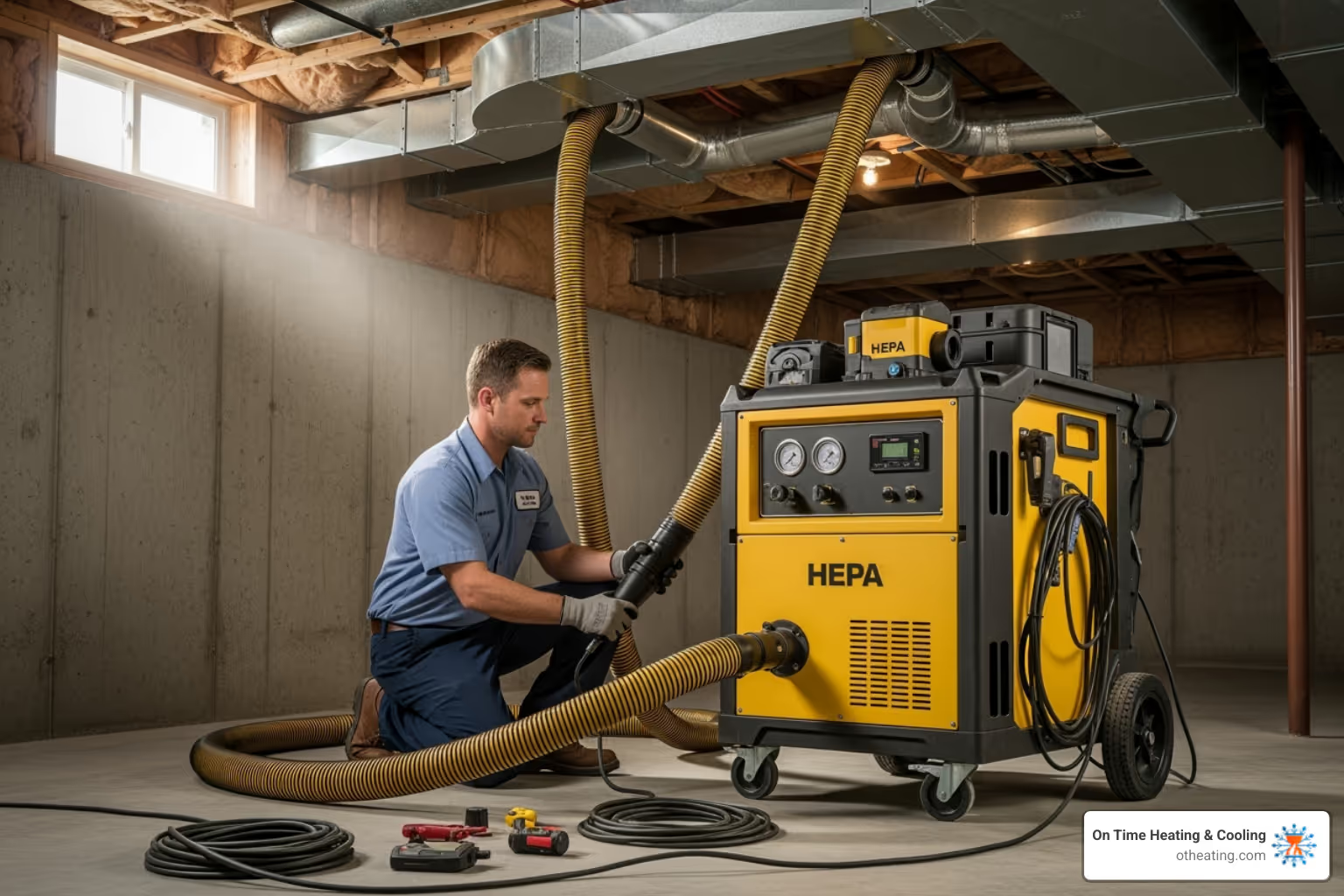
Breathe Easy Unpacking the Benefits of HVAC System Cleaning
Why Your Home's Air Quality Depends on HVAC System Cleaning
HVAC system cleaning involves removing dust, debris, and contaminants from your heating and cooling system's components, including air ducts, coils, blower motor, and air handler. This process improves indoor air quality, increases energy efficiency by 20-30%, and extends your system's lifespan by reducing wear and tear on critical components.
Key benefits of HVAC system cleaning:
- Better air quality - Removes allergens, dust, and mold spores that circulate through your home
- Energy savings - Clean systems work more efficiently, reducing utility bills
- System longevity - Less strain on components means fewer breakdowns and repairs
- Health improvements - Especially important for family members with allergies or respiratory conditions
Your HVAC system acts as the "lungs of your home," circulating air throughout your living spaces. According to industry research, contaminants get pulled into your system and recirculated 5 to 7 times per day on average. Over time, dust, pet dander, pollen, and other particles build up in your ductwork and system components.
When your system is dirty, it has to work harder to maintain comfortable temperatures. Studies show that 25 to 40 percent of the energy used for heating and cooling gets wasted due to contaminated systems. That's why proper maintenance, including professional cleaning when needed, can cut your energy bills significantly.
The cleaning process targets much more than just air ducts. A complete system cleaning addresses all components in the airstream - from supply and return ducts to coils, blower motors, and drain pans.

Why Clean Your HVAC System? The Top 3 Benefits
Think of your HVAC system as your home's hardworking friend who never takes a day off. Day and night, it's moving air through your house, keeping you comfortable through scorching summers and freezing winters. But just like any hardworking friend, it needs a little TLC to perform its best. HVAC system cleaning isn't just about making things look nice - it delivers three game-changing benefits that affect your health, your wallet, and your peace of mind.

Better Indoor Air Quality and Health
Your HVAC system is constantly pulling air from your home, and unfortunately, that air comes with uninvited guests. Allergens like pollen sneak in through windows and doors. Dust settles on every surface. Pet dander floats around if you have furry family members. Mold spores can develop in damp areas and spread throughout your system.
All these particles get sucked into your ductwork, where they build up over time. Your system recirculates the same air 5 to 7 times daily. That means these contaminants keep cycling through your living spaces, creating a never-ending loop of poor air quality.
For family members dealing with respiratory conditions like asthma or chronic allergies, this buildup can turn their own home into a source of discomfort. Even people with autoimmune disorders may notice their symptoms getting worse when indoor air quality suffers.
Professional HVAC system cleaning breaks this cycle. By removing the accumulated debris from your ductwork and system components, you're essentially giving your home's air a fresh start. The result? Cleaner, healthier air that everyone can breathe easier.
Want to dive deeper into how clean ducts support better health? Check out Why Air Duct Cleaning Improves Health and explore the Benefits of Professional Air Duct Cleaning.
Increased Energy Efficiency and Savings
Here's where things get interesting for your budget. When dust and debris coat your system's components, it's like asking someone to run a race while breathing through a straw. Your HVAC system has to work much harder to push air through clogged ducts and around dirty coils.
This extra effort creates serious system strain. Your blower motor runs longer. Your heating and cooling cycles take more time to reach the right temperature. All that extra work translates directly into wasted energy - studies show that 25 to 40 percent of your heating and cooling energy gets thrown away due to dirty systems.
But here's the good news: HVAC system cleaning can flip this situation around. When your system can breathe freely again, it operates the way it was designed to. Improved airflow means your unit reaches your desired temperature faster and maintains it more easily. This efficiency boost can cut your utility bills by 20 to 30 percent - that's real money staying in your pocket month after month.
Learn more about how clean systems save you money by reading How Air Duct Cleaning Improves Your HVAC. The EPA's Energy Star website also offers great resources on home energy efficiency.
Extended HVAC System Lifespan
Nobody wants to deal with surprise HVAC breakdowns, especially during the hottest day of summer or the coldest night of winter. Unfortunately, dirty systems are much more likely to fail when you need them most.
When your system struggles against built-up debris, every component works overtime. Your blower motor spins harder to move air through clogged ducts. Heat exchangers and coils work extra hard to transfer heat through layers of dust and grime. This constant component wear and tear adds up quickly.
Think of HVAC system cleaning as preventative maintenance that pays dividends. By removing the obstacles that force your system to overwork, you're reducing stress on every moving part. Clean systems experience fewer breakdowns, need fewer emergency repairs, and simply last longer.
The math is pretty simple: investing in regular cleaning helps you avoid the much bigger expense of premature system replacement. Your HVAC system will thank you with years of reliable, trouble-free operation.
Find more about protecting your investment by reading How Clean Vents Improve Your HVAC.
When to Schedule a Cleaning: Key Signs and Triggers
Think of your HVAC system like a good friend who's too polite to complain. It'll keep working hard for you even when it's struggling, but if you know what to look for, it'll give you gentle hints when it needs help. Understanding these signs can save you from bigger problems and help you breathe easier at home.

Telltale Signs Your System is Dirty
Your home has a way of telling you when something's not quite right. When it comes to your HVAC system, these warning signs are often hiding in plain sight.
Visible dust from vents is usually the first clue most homeowners notice. If you see dust bunnies dancing around your air vents or notice a film of dust settling on furniture faster than usual, your system might be working overtime to push air through dirty ducts. As the National Air Duct Cleaners Association puts it simply: if your air ducts look dirty, they probably are.
Persistent musty odors are another red flag. That stale, earthy smell that seems to appear whenever your system kicks on? It could mean mold or mildew has made itself at home in your ductwork. Nobody wants to breathe that in.
Uneven heating and cooling throughout your home often points to airflow problems. When some rooms feel like a sauna while others feel like an icebox, despite your thermostat settings staying the same, blocked or dirty ducts might be the culprit.
Increased allergy symptoms in your family can be especially telling. If everyone's suddenly sneezing, coughing, or dealing with itchy eyes without any obvious cause, your HVAC system might be circulating allergens instead of clean air.
Noisy operation is your system's way of crying for help. While some sounds are normal, new rattling, whistling, or groaning noises often mean components are working harder than they should because of dust buildup.
Specific Events That Warrant a Cleaning
Life happens, and sometimes those big life events create the perfect storm for a dirty HVAC system. Home renovations top the list - all that drywall dust, sawdust, and construction debris has to go somewhere, and unfortunately, your ducts make an excellent collection point. Even with the best precautions, renovation dust finds its way into everything.
Buying a new home is exciting, but it also means inheriting someone else's maintenance habits (or lack thereof). You don't know if the previous owners kept up with cleaning, or if the house sat empty for months collecting dust and possibly hosting unwanted critters.
Water damage or flooding creates serious concerns beyond just the immediate cleanup. Moisture in your ductwork becomes a breeding ground for mold and bacteria that then gets distributed throughout your home with every cycle of your system.
Recent pest or rodent infestations leave behind more than just bad memories. Mice, squirrels, or insects in your attic or basement can leave droppings, nesting materials, or worse in your ducts. Once you've dealt with the pest problem, it's time to clean up what they left behind.
Unexplained family illnesses might seem unrelated to your HVAC system, but poor indoor air quality can contribute to respiratory issues, skin problems, and other health concerns. If multiple family members are having health problems that doctors can't easily explain, your air quality deserves a closer look.
For more guidance on timing your cleaning, check out When to Schedule Air Duct Cleaning.
The Debate: Is Routine HVAC System Cleaning Necessary?
Here's where things get interesting. The EPA takes a cautious "clean as needed" approach, noting that research on HVAC system cleaning is still developing. They suggest that if no one in your home has allergies or unexplained symptoms, and your system looks reasonably clean during inspection, routine cleaning might not be necessary.
Industry professionals, including NADCA, often recommend cleaning every 3-5 years, with some situations calling for more frequent attention. So who's right?
We think the truth lies somewhere in the middle, and it depends on your specific situation. Homes with pets accumulate dander and hair much faster than pet-free homes. Smokers in the house create residue buildup that clings to ductwork surfaces. Family members with allergies or asthma benefit significantly from cleaner air circulation.
Recent renovations, construction work, or moving into a new home (especially older properties) often create immediate needs for cleaning, regardless of any schedule.
The EPA is right that light household dust in ducts isn't necessarily harmful. But we also know that your system recirculates air 5-7 times daily, and over time, contaminants do build up. We believe in taking a practical approach: have a qualified professional inspect your system and give you an honest assessment of whether cleaning would benefit your specific home and family.
Every home is different, and every family's needs are unique. What matters most is making an informed decision based on your actual situation, not a one-size-fits-all recommendation. Learn more about the Importance of Regular Air Duct Cleaning to help guide your decision.
The Professional HVAC System Cleaning Process: What to Expect
When you schedule a professional HVAC system cleaning, you're not just getting someone to run a vacuum through your ducts. You're investing in a thorough, methodical process that addresses your entire heating and cooling system. Think of it like getting a deep clean for your home's respiratory system – every component gets the attention it deserves.

Key Components Targeted in HVAC System Cleaning
Here's something that might surprise you: true HVAC system cleaning goes way beyond just air ducts. While many people call it "air duct cleaning," that's really selling the service short. The National Air Duct Cleaners Association (NADCA) makes this crystal clear – if you only clean the ducts and leave the rest of the system dirty, you're basically asking for trouble. It's like washing your car but leaving the engine covered in grime.
When we tackle your system, we're looking at the whole picture. Your supply and return ducts are just the highways where air travels, but we also need to clean the destinations and pit stops along the way. Those registers and grilles you see on your walls and ceilings? They're getting attention too, since they're the gateways where air enters and exits your living spaces.
The real workhorses of your system – the blower motor and housing – often collect some of the heaviest buildup. When your blower fan is caked with dust, it's like trying to cool yourself with a fan that's wrapped in a blanket. Not very effective! We also focus on your evaporator and condenser coils, which are absolutely critical for heat exchange. When these get dirty, your system has to work overtime just to do its basic job.
Don't forget about that drain pan sitting quietly beneath your evaporator coil. It catches condensation all day long, and if it's not kept clean, it becomes a perfect little swimming pool for mold and bacteria. The air handler unit, heat exchanger (in furnaces), and even the area around your air filter all get our attention because every component in the airstream matters.
The bottom line? We clean it all because leaving even one dirty component means your freshly cleaned ducts won't stay that way for long. You can see exactly what we focus on during our service by checking out What We Do During Vent Cleaning.
The Cleaning Method: How Professionals Do It Right
Professional HVAC system cleaning relies on what we call the "source removal" method. Fancy name, simple concept – we physically remove the dirt and debris from your system instead of just pushing it around or trying to kill it with chemicals.
Our process starts with a thorough system inspection. We're not just peeking around – we're doing detective work. We need to understand what we're dealing with: how much buildup there is, whether there are any existing problems, and what the best approach will be for your specific system. We're looking for blockages, moisture issues, and any signs that unwanted microorganisms have set up shop in your ducts.
Sometimes we need to create small access points to reach every nook and cranny of your ductwork. Don't worry – our technicians are trained to make these openings precisely and professionally. When we're done, we'll seal and insulate them properly so there's no air leakage. It's like keyhole surgery for your HVAC system.
The heart of our operation is the high-powered, HEPA-filtered vacuum we connect to your ductwork. This creates what we call "negative pressure" throughout your entire system. Think of it as creating a powerful suction that pulls air and loosened contaminants toward the vacuum, preventing anything from escaping into your home. It's like having a giant straw connected to your ducts.
While that vacuum is doing its job, we use specialized agitation tools to break loose the stubborn stuff that's really stuck to your duct surfaces. These might be rotary brushes, air whips, or compressed air nozzles – basically, whatever it takes to convince that debris to let go and head toward our vacuum. It's a bit like using a scrub brush while the drain is open.
We don't stop at the ducts, either. Each component gets individual attention with the right brushes, vacuums, and HVAC-specific cleaning agents. We're careful to protect your home throughout the process, making sure dust and debris stay contained within the system where they belong.
Once everything's clean, we do a final system test to make sure everything is running smoothly and efficiently. After all, what good is a clean system if it doesn't work properly?
Our team believes in keeping you informed every step of the way. For more details about our approach, visit Our Professionals Explain Vent Cleaning.
A Note on Chemical Biocides and Sealants
You might encounter companies that want to spray chemicals or apply sealants during your HVAC system cleaning. We think it's important to give you the straight story on these products because the industry takes a pretty cautious approach to them.
The EPA has some serious reservations about chemical biocides in air ducts. The research on their effectiveness and health effects just isn't there yet, and that makes us uncomfortable. While a few products are approved for use on bare metal ducts, none are registered for porous materials like fiberglass duct board. Even when they are appropriate, biocides should only be used after mechanical cleaning and only when there's clear evidence of microbial contamination that physical cleaning can't handle.
We've seen too many cases where these chemicals were applied improperly or on inappropriate materials, potentially creating health risks instead of solving problems. Our philosophy is simple: if we can clean it mechanically and safely, that's our first choice.
Sealants are another area where we proceed with caution. Some companies claim these products will encapsulate contaminants and prevent dust from escaping, but the long-term research on their effectiveness, safety, and durability is limited. Most reputable organizations don't recommend routine use of sealants. They're generally reserved for specific repair situations – like sealing damaged insulation or addressing fire damage – rather than as a catch-all solution.
There's also the concern that sealants could affect important characteristics of your ductwork, like acoustical properties or fire resistance, and might even void manufacturer warranties.
We believe in being transparent with our customers and only recommending what's truly necessary and proven safe for your home. If you want to learn more about how these products are regulated, the EPA provides information on regulating antimicrobial pesticides.
Frequently Asked Questions about HVAC System Cleaning
When homeowners start considering HVAC system cleaning, they naturally have questions. We've heard them all over the years, and we're happy to share what we've learned from helping families throughout Menomonee Falls and beyond.
How much does HVAC system cleaning cost?
The investment for professional HVAC system cleaning varies based on your home's unique needs. Most residential services fall within a typical range, but several factors influence the final cost.
Home size plays the biggest role - a cozy ranch home requires less time and effort than a sprawling two-story house with extensive ductwork. System complexity also matters. If you have multiple HVAC units, intricate ductwork layouts, or components in hard-to-reach areas like tight crawl spaces, expect the process to take longer.
The level of contamination affects pricing too. A system that's been well-maintained will clean up faster than one dealing with heavy dust buildup, mold growth, or the aftermath of a pest infestation.
Here's something important: be cautious of companies advertising extremely low flat rates. These "too good to be true" prices often signal superficial cleaning or aggressive upselling tactics. Some companies even falsely claim "EPA certification" - but the EPA doesn't actually certify duct cleaning companies.
We believe in transparency, so we always provide written estimates after thoroughly assessing your system. This way, you know exactly what you're getting and why it's priced that way.
How long does the cleaning process take?
Most residential HVAC system cleaning projects take 3 to 5 hours to complete properly. The timeline depends on several factors that make each home unique.
Total ductwork length is a major consideration. A home with multiple zones or levels naturally has more ducts to clean. The number of vents and returns throughout your house also adds to the process time.
If you have multiple HVAC units serving different areas of your home, we'll need additional time to clean each system thoroughly. Homes with heavy contamination from renovations, pets, or neglected maintenance require more intensive work.
Accessibility plays a role too. Some ductwork runs through easily accessible basements, while other systems snake through tight attic spaces or cramped crawl areas.
Our professional teams work efficiently while maintaining thoroughness. We understand you don't want your daily routine disrupted any longer than necessary. After our initial assessment, we'll give you a realistic timeframe so you can plan your day accordingly.
Can I clean my HVAC system myself?
While we appreciate the DIY spirit, HVAC system cleaning is one area where professional expertise makes a real difference. That said, there are important maintenance tasks you can and should handle yourself.
Regular filter changes are the most crucial DIY step. Standard 1-inch filters need replacing every 1-3 months, more often if you have pets or family members with allergies. Higher-efficiency filters might last 6-12 months, but check them regularly.
You can easily clean visible registers and grilles by removing them and washing or vacuuming away surface dust. Keeping your outdoor unit clear of leaves, grass clippings, and debris helps your system breathe easier. Vacuuming around supply and return vents prevents surface dust from getting pulled into your system.
However, thorough cleaning has significant limitations for homeowners. You can only reach what's visible, but the vast majority of your ductwork and internal components remain hidden behind walls and in inaccessible spaces.
Professional equipment makes the real difference. Effective cleaning requires powerful, HEPA-filtered vacuums and specialized agitation tools like rotary brushes and air whips. These aren't tools most homeowners have lying around.
Attempting DIY deep cleaning can actually create bigger problems. Without proper containment, you might spread contaminants throughout your home instead of removing them. Improper handling can damage delicate system components, leading to expensive repairs. You could even push debris deeper into your system, creating new blockages.
For comprehensive cleaning that actually improves your indoor air quality, professional service is the smart choice. Our team has the training, equipment, and experience to do the job safely and effectively. Learn more about Common Vent Cleaning Mistakes and Prevention to understand why professional service matters.
Conclusion: Your Next Step to a Healthier Home
Throughout this guide, we've taken a comprehensive look at HVAC system cleaning and why it matters so much for your home and family. We've covered how a clean system dramatically improves your indoor air quality, reduces those pesky allergens that make family members sneeze and cough, and creates a fresher breathing environment for everyone.
We've also explored the impressive energy savings that come with a clean system - remember, you could be wasting 25 to 40 percent of your heating and cooling energy when your system is dirty! That translates to real money back in your pocket, with many homeowners seeing their utility bills drop by 20 to 30 percent after a professional cleaning.
Beyond the immediate benefits, we discussed how HVAC system cleaning extends your system's lifespan by reducing strain on critical components like your blower motor and coils. Think of it as preventative care that helps you avoid those expensive emergency repairs and premature system replacements.
You've learned to recognize the warning signs - from visible dust coming from vents to persistent musty odors and uneven temperatures throughout your home. We've also covered specific situations that call for immediate attention, like home renovations, water damage, or pest infestations.
Most importantly, we've shown you what professional service looks like. Real HVAC system cleaning goes far beyond just the ducts - it's a comprehensive process that addresses your entire system using specialized equipment and proven techniques.
At On Time Heating & Cooling, we understand that your home is your sanctuary, and we're committed to helping families in Menomonee Falls, Brookfield, Delafield, and throughout Southeastern Wisconsin breathe easier. Our team combines the reliability and care of old-school customer service with modern cleaning techniques and equipment.
We believe in showing up on time, every time, and treating your home with the same respect we'd want for our own families. When you're ready to experience the difference that professional HVAC system cleaning can make, we're here to help.
Ready to take that next step toward cleaner air and a more efficient home? Contact us for Vent Cleaning in Menomonee Falls, WI and let our experienced team show you why so many homeowners trust On Time Heating & Cooling for their indoor air quality needs.

%202%20(1).svg)
.svg)

.svg)
.svg)
.svg)

.svg)